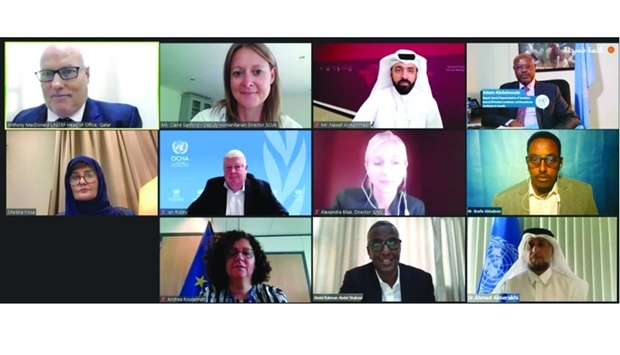Qatar Charity (QC) and the Centre for Humanitarian and Development Studies (RASD) convened a virtual panel discussion on famine in Somalia under the title 'Towards effective and urgent response'.
The virtual event gathered UN agencies, INGOs and local actors, including the UN Office for Co-ordination of Humanitarian Affairs, European Civil Protection and Humanitarian Aid Operations (ECHO), International Displacement Monitoring Centre (IDMC), and Save the Children, as well as attendees from more than 25 countries.
In his opening remarks, HE Dr Ahmed al-Muraikhi, Special Adviser to the UN Secretary-General on public-private partnerships and Islamic financing, stressed that dynamic solutions to addressing the complex challenges of food insecurity in Somalia should be prioritised and explored through building partnerships among NGOs and with the private sector to generate innovative solutions.
The special envoy of the Somalipresident for humanitarian affairs and droughts gave keynote remarks. Abdel Rahman AbdelShakour reflected the reality of the situation in Somalia amid the catastrophic drought further exacerbated by the Covid-19 pandemic. He said: “We are calling for international donors, corporate foundations and individual philanthropic donors to urgently fund the current humanitarian appeal to respond to the drought crisis currently in Somalia. Let us save millions of lives, change the story, and avert the current drought situation, which is the worst yet experienced in a decade.”
The event also featured interventions by Andrea Koulaimah Gabriel, director, Sub-Saharan Africa, Asia, Latin America and Pacific at the European Civil Protection and Humanitarian Aid Operations; Alexandra Bilak, director of the IDMC; Nawaf al-Hammadi, assistant CEO of the Operations and Programmes Sector at QC; Claire Sanford, deputy humanitarian director for Save the Children UK; Shafie Abtadoon, director of the monitoring centre for RASD Somalia; and Ian Ridley, head of OCHA Somalia.
Al-Hammadi said: “There are several key factors for ensuring an effective and rapid response in Somalia: always keep local communities on board, invest in finding long-term durable solutions to recurrent emergencies, and closely co-ordinate efforts in harmony with local actors on the ground and UN agencies to ensure rapid, cost-effective and impactful humanitarian assistance.”
Closing the event, HE Sheikha Hessa bint Khalifa al-Thani, Special Envoy of the Arab League Secretary-General for Humanitarian Affairs, expressed the importance of building the resilience of communities in Somalia. “It is necessary to invest and adopt long-term developmental solutions, enhance local production of goods and services needed by the Somali people, and build the resilience of communities through enhancing local capacities and promoting economic empowerment.”
The event comes amid alerts from UN agencies warning that nearly half the population of Somalia faces acute levels of food insecurity and a growing risk of famine as the country is faced with the worst drought in 40 years.
In his opening remarks, HE Dr Ahmed al-Muraikhi, Special Adviser to the UN Secretary-General on public-private partnerships and Islamic financing, stressed that dynamic solutions to addressing the complex challenges of food insecurity in Somalia should be prioritised and explored through building partnerships among NGOs and with the private sector to generate innovative solutions.
The special envoy of the Somalipresident for humanitarian affairs and droughts gave keynote remarks. Abdel Rahman AbdelShakour reflected the reality of the situation in Somalia amid the catastrophic drought further exacerbated by the Covid-19 pandemic. He said: “We are calling for international donors, corporate foundations and individual philanthropic donors to urgently fund the current humanitarian appeal to respond to the drought crisis currently in Somalia. Let us save millions of lives, change the story, and avert the current drought situation, which is the worst yet experienced in a decade.”
The event also featured interventions by Andrea Koulaimah Gabriel, director, Sub-Saharan Africa, Asia, Latin America and Pacific at the European Civil Protection and Humanitarian Aid Operations; Alexandra Bilak, director of the IDMC; Nawaf al-Hammadi, assistant CEO of the Operations and Programmes Sector at QC; Claire Sanford, deputy humanitarian director for Save the Children UK; Shafie Abtadoon, director of the monitoring centre for RASD Somalia; and Ian Ridley, head of OCHA Somalia.
Al-Hammadi said: “There are several key factors for ensuring an effective and rapid response in Somalia: always keep local communities on board, invest in finding long-term durable solutions to recurrent emergencies, and closely co-ordinate efforts in harmony with local actors on the ground and UN agencies to ensure rapid, cost-effective and impactful humanitarian assistance.”
Closing the event, HE Sheikha Hessa bint Khalifa al-Thani, Special Envoy of the Arab League Secretary-General for Humanitarian Affairs, expressed the importance of building the resilience of communities in Somalia. “It is necessary to invest and adopt long-term developmental solutions, enhance local production of goods and services needed by the Somali people, and build the resilience of communities through enhancing local capacities and promoting economic empowerment.”
The event comes amid alerts from UN agencies warning that nearly half the population of Somalia faces acute levels of food insecurity and a growing risk of famine as the country is faced with the worst drought in 40 years.

